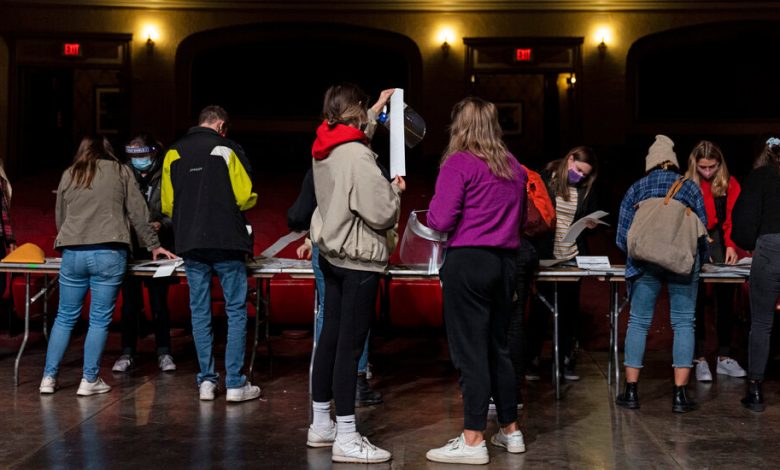Democratic Group Plans $10 Million Push to Protect Election Officials

A group that works to elect Democrats as the top election officials in states around the country is planning a $10 million venture to pay for private security for election officials of both parties, register new voters and try to combat disinformation.
The group, the Democratic Association of Secretaries of State, is starting a tax-exempt 501(c)(4) organization called Value the Vote that will initially focus on five battleground states: Georgia, Arizona, North Carolina, Nevada and Wisconsin.
“We’ve seen our election officials come under threat while they’re just trying to do their jobs, and they’re doing a fantastic job,” said Travis Brimm, the executive director of the Democratic group, who will also serve as president of Value the Vote. “They deserve the ability and the right to feel safe while they’re doing their job.”
Mr. Brimm said the new group had raised $2.5 million so far of its $10 million pledge.
Since the 2020 election, once-uncontroversial matters of election administration have increasingly become entangled in partisan politics.
Election officials have faced increased threats in recent years, and they have been resigning at an alarming rate. Elections for secretary of state also became far more politicized last year, as several Republicans who denied the legitimacy of the 2020 vote sought the office in critical battleground states before ultimately falling short.
In turn, the Democratic Association of Secretaries of State grew rapidly after the 2020 election, when former President Donald J. Trump’s attempts to overturn the results drew attention to the importance of the position. The group went from raising a few million dollars each election cycle to raising and spending more than $30 million in the midterms last year.
Officials at the group say they will provide equal funding opportunities to both Democratic and Republican election officials, but how the distribution will work in practice is unclear. Republican officials may hesitate to take money from a Democratic organization, fearing political fallout from fellow conservatives.
Mr. Brimm said that election officials could request grants to pay for private security themselves, and that Values the Vote would also proactively offer private security.
The introduction of private security with a loose affiliation to a political group could carry risks, however, especially in an era of extreme polarization and partisan distrust in the mechanics of voting.
The safety funding is also likely to serve as an early test of new bans on outside funding of elections in Georgia and Arizona, which passed laws after the 2020 election prohibiting private groups from providing financial help to election officials. The bans were rooted in conservative criticism of grants made by an organization with ties to the Facebook founder Mark Zuckerberg — money frequently called “Zuckerbucks” by right-wing news outlets.
Republicans in the North Carolina legislature, who have veto-proof majorities, are currently seeking to pass a bill that would also ban outside money for election officials.
Campaign finance experts note that the new laws are untested, and say they include some gray areas that could allow for the security donations.
“The 501(c)(4) could theoretically provide security services directly to state election officials or at voting or vote-counting sites without charging for them,” said Brett Kappel, an campaign finance lawyer at the firm Harmon Curran. “It will take a court to decide if that is prohibited donation of services or whether it falls within the exception for services provided without remuneration.”
Mr. Brimm said the group was working with a legal team to make sure it was “navigating those laws correctly.”
“In some ways, it’s going to be a little bit of a new frontier,” he said.
The rest of the initiative hews more closely to traditional campaign tactics and organizing. The group will look to counter election misinformation, including with paid digital advertising, and will begin a voter registration program.
And though the group says it will be apolitical, its voter registration efforts align with typical Democratic efforts, focusing heavily on Black and Latino communities, which have tended to back Democrats in greater numbers.
“The voter registration piece is about actually getting more people into the process,” Mr. Brimm said. “The people who are not getting access to voter education and voter registration are typically rural communities, typically lower-income communities and Black and Latino or Hispanic communities.”



